How I began Communicating in a new language
Reading time: 32 min
I said in my first post when I began writing here in Italian that I would eventually publish my methods and perhaps make recommendations. I'm prepared to do that now.
For whatever reason, idea after idea has been coming to me and I feel distinctly compelled to share. After a review of context, I'll start with what I did to begin communicating effectively with native speakers within a month, how I continued post two significant periods of exhaustion to reach an intermediate level within 5 months, and how I've more recently resolved moments of what could seem like waning interest. I'll follow with what I do now, having surpassed 7-8 total months of study and reached a point where I can regularly have mutually comprehensible conversations with Italian speakers. I'll then discuss any other ideas I've had, whether or not I've yet gotten a chance to implement them.
Context
I have a regular habit of traversing languages, making use of languages I previously have not, exploring alternate methods of communication, etc. I have been in consistent contact with languages that are not standard American English my entire life. Even more specifically, at different points, I have personally committed time and effort to learning to communicate in French, Mandarin, Latin, Spanish, Danish, Norwegian, Greek, and Portuguese. There was also about a week of Italian the autumn or late summer of 2017.
Previous linguistic exploration:
- French
- Under a year in early childhood; Home tutor
- A few months from 2017-2018; Self-study
- Two months in 2020; Self-study
- A week or two in 2021; Self-study
- Mandarin
- Six-eight months from 2006-2007; Extracurricular course
- Latin
- Eight+ months from 2009-2010; Academic course
- Spanish
- Seven years from 2010-2017; Academic course
- Danish
- Three-six months from 2014-2015; Self-study
- Norwegian
- About two years from 2015-2017; Self-study
- Continued regular interaction with the language until about 2019
- Italian
- A few days in 2017; Self-study
- Modern Greek
- Two months in 2018; Academic course
- Two months continued learning in 2018; Self-study
- Portuguese
- A week or two some time between 2018 and 2021; Self-study
The languages I have previously been comfortably conversational in include Mandarin, Latin, Spanish, Norwegian, and Greek. Without study, I also have a natural understanding and comfort with Patwa (spoken in Jamaica) and some parts of African American Vernacular English (AAVE). These last two are particularly significant. I've noticed a lot of the grammatical structures in Italian that I find intuitive have perfect or near-perfect mirrors in Patwa and AAVE. My understanding of these structures has often felt even more natural than my understanding of structures that also exist in a language like Spanish.
Other knowledge:
- Patwa
- Native
- AAVE
- Semi-native
First
Preparation
In my mind, I consistently slip out of American English, but I don't know of any pattern in what I may slip into. Knowing the amount of vocabulary sitting in my head waiting to be uncovered and how much of that vocabulary could easily be confused with the Italian I was preparing to learn, one of the first things I did was begin rejecting other languages in all forms. I particularly did this with the languages I've previously been conversational in. The natural part of me that begins comprehending text and audio in other languages— as soon as I sensed it arising, I would tell myself I do not know [language], I do not understand [language], I do not use [language], I do not speak [language]. In fact, I began saying this to myself before I made my first effort in Italian, if you don't consider this an effort in itself. The two truths I allowed myself to accept: (1) I understand Italian and (2) I understand English. With time, I also allowed myself moments of difficulty with spoken English, but I'll get back to this.
Consumption
I was immediately consuming content in Italian. In fact, consuming came first. I was watching Odio il Natale on Netflix, decided in the moment I would book a trip to Chioggia, and decided in the following moment I would learn Italian and that this relationship with Italian would extend beyond my travel. This occurred the 18th of December in 2023, I believe. I was completing final exams, so the first official moment of learning was on the 21st ahead of my travel "deadline" set for the 29th of January.

I almost forgot: Odio il Natale is based on a Norwegian series, Hjem til Jul. I have previously watched and rewatched Hjem til Jul several times. Even before committing to this path, there were lines I could understand when they seemed to be perfect or near-perfect mirrors of lines from the Norwegian series. I was already extracting vocabulary from Odio il Natale at this point.
Apps
On the 21st of December, I downloaded Busuu. I remembered enjoying either Busuu or Memrise in the past, and settled on Busuu because of the community feedback on written and spoken exercises.
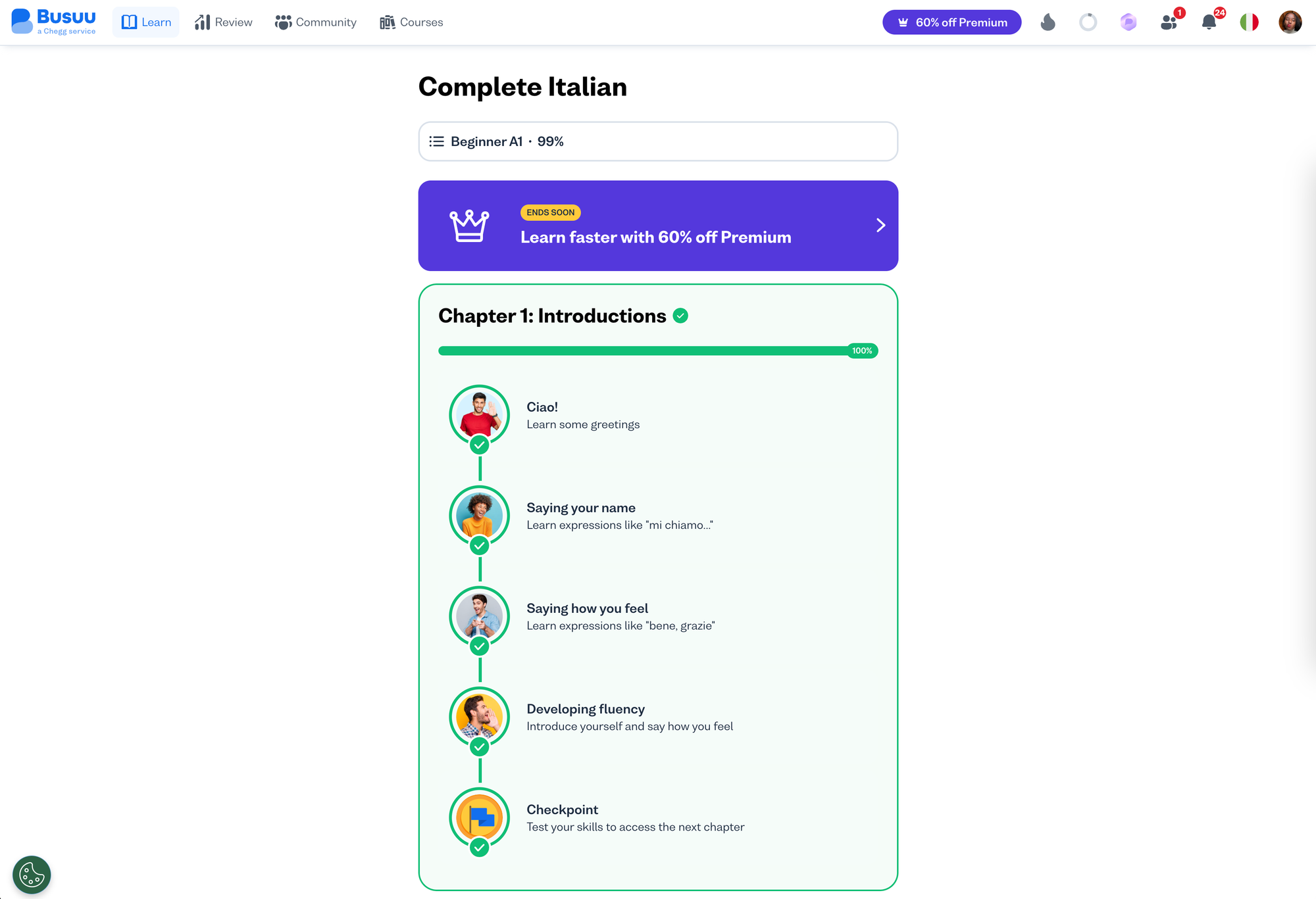
I used Busuu for about 2 days without other materials before reaching an unbearable point of understimulation. I then prepared to learn the most common 1,000 words in Italian.
Frequently Used Words
The commitment I made was 100 words a day. The task itself was simple, I could learn any set of 100 words within an hour, and usually within 30 minutes, but I got bored. The first few times, it was fun. After the third day (having learned 300 words), I began preferring pretty much anything else to this task. I don't think I reached 400 words from Strømmen's 1000 until over a week later. I never quite made it to the 500. I still haven't and that's very much okay with me.
Although I didn't study to 1,000, I want to discuss how I did study and memorise. In this first part of my relationship with the language, I used OmniSets. I was having trouble with Anki, and this was my favourite of the alternatives I found. Even now that I have Anki again, OmniSets is my first choice for certain situations. With OmniSets, I start by using multiple choice, selecting longer complete review, and answering with Italian. The sets I created have terms in Italian and definitions in English, so the following gives me a quiz that prompts with English words and offers four Italian options to choose from. For a completely new set of words or phrases I presumably know nothing of, this is how I begin. It allows me to use any intuition or instincts around cognates that I have and strengthen that trust immediately when I answer correctly. This was important. From the very beginning, a priority for me was developing instinct. Knowledge is easy. I can't use that knowledge if I don't have trust.
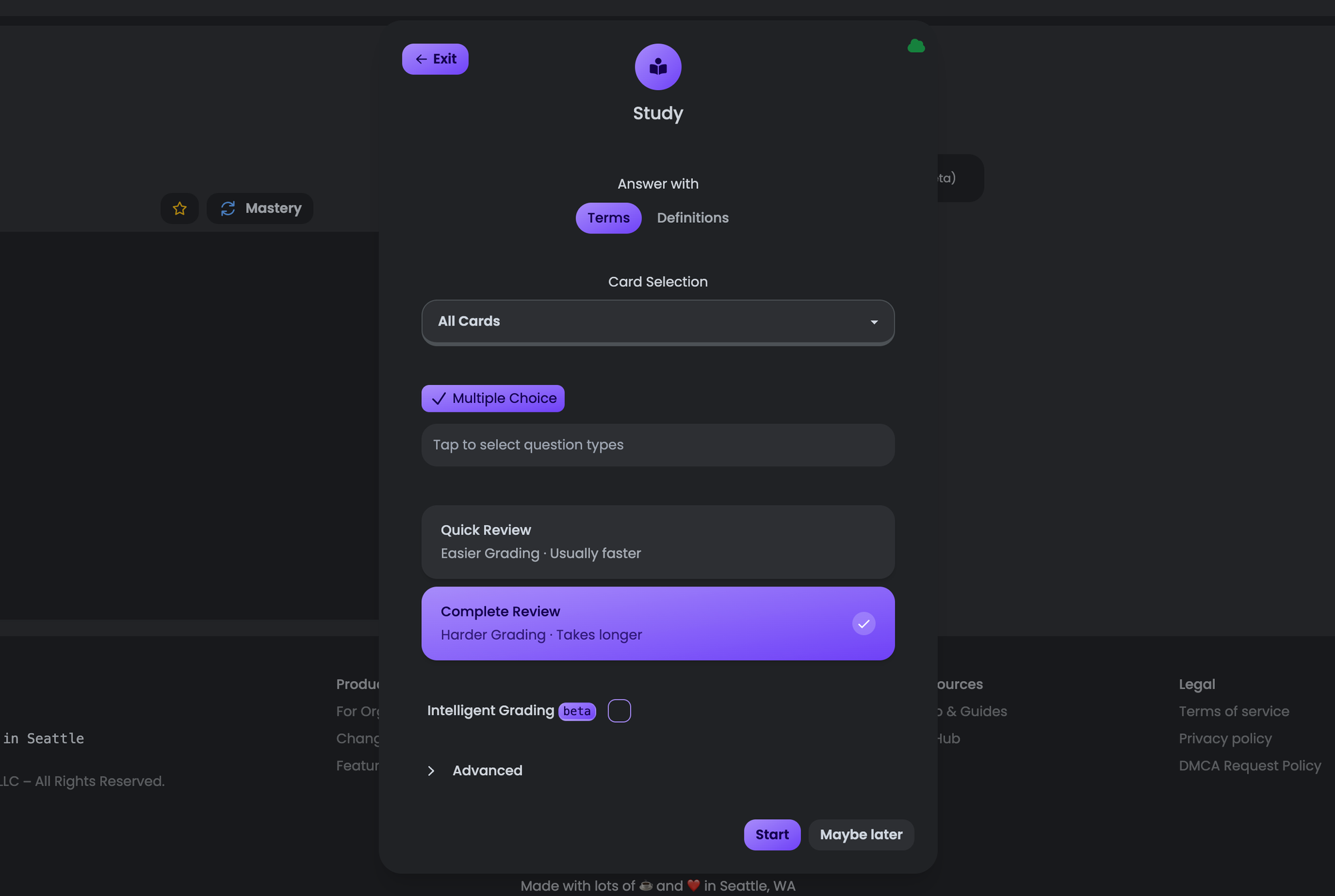
I completed quizzes at least twice this way before ever answering with definitions instead of terms. Because language can be a bit unpredicatable, I didn't manually create this set, there are duplicate words mapped to different meanings, etc., I never used the written choice option. It would only serve to penalise me for quirks of the set's construction and undermine developing instincts.
Although I was "rejecting" past knowledge, between my longterm familiarity with romance languages and learning the first few hundred words, I could make good sense of TV series' in Italian. I could make enough sense to understand phrases I was hearing, get excited about my comprehension, and begin repeating those phrases throughout the day. Along with the lessons I was doing on Busuu, I also knew enough by this point to begin writing about myself.
Writing & Scripting
Since I knew I would be travelling quite soon, within the first week and a half, I began scripting. I had some phrases that could generally be useful while travelling, some phrases that specifically communicate things I say frequently in English, and a few paragraphs describing my day, my plans, or how I ended up travelling to Chioggia. The phrases were easy to remember. I kept them as a list in Google Sheets. Since many of them were short phrases that I use often, once I had a translation, I immediately had natural use for them. I hardly ever studied them but they stayed in my head. The vocabulary in the sentences also usually intersected with vocabulary from the first few hundred common words, so I had sufficient knowledge to derive many of the phrases if I couldn't outright remember them. The paragraphs required a little more intention and the objective here was to learn and memorise them as I would vocabulary words. Each sentence was a flashcard, and I studied this way. Again, I already had some working knowledge of Italian so it wasn't terribly difficult, but this was the first point at which I was more consciously stretching my abilities and learning "higher level" grammar. I had a natural curiosity that prompted my trying to understand any structures in these sentences that weren't intuitive or easy to replicate with vocabulary alone. Some of these structures were present more than once and I began noticing them more in the content I was consuming so I was able to train my understanding fairly quickly. I also frequently translate with Reverso Context, so translations are consistently accompanied by a wealth of contextual examples.
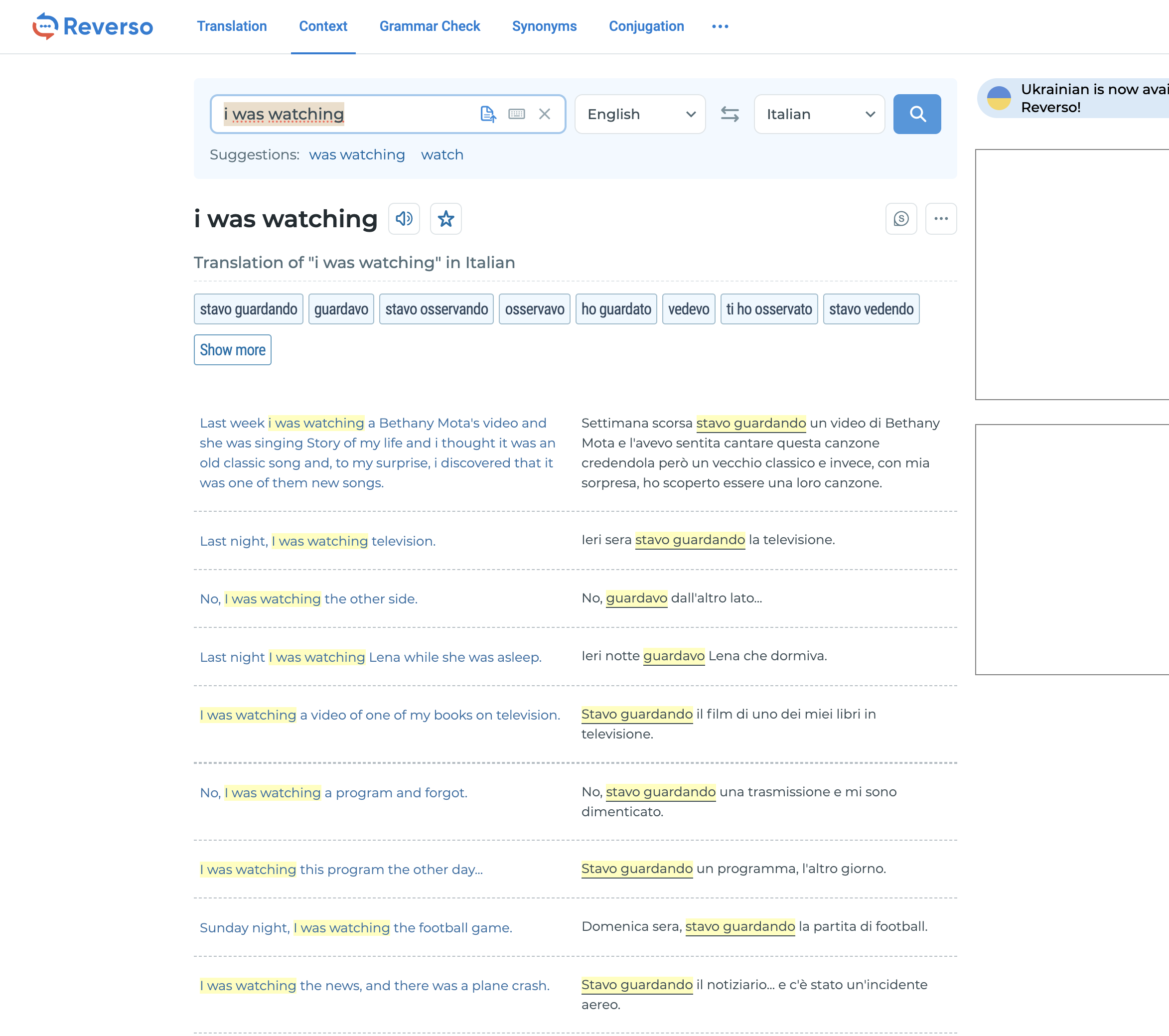
I believe I only ever wrote 3 paragraphs at the start. I had others planned but didn't complete them. Regardless, by the end of the first 1-2 weeks, I was already using Italian to communicate my own feelings and ideas and interjecting it into my daily stream of consciousness.
The End of Period One
Early in January, I had my first period of exhaustion. Exhaustion is perhaps misleading because it had nothing to do with Italian itself, but for reasons, my priorities had to shift and I was not able to commit to Italian in the same ways. I wasn't able to review materials as usual, but I did meet with two tutors 3-4 weeks before I left for Chioggia. In both lessons, the conversation was in Italian. No other concerted efforts were made during this time.
The level I reached that allowed me to have simple conversations resulted from at most 2 weeks of effort. I was of course still consuming content (audio and visual) throughout the other period, but I didn't consider it "study". At that point, it just so happened the content and entertainment I most wanted in my day often ended up being in the Italian language. I do still know whether I made an effort or not, any interaction with a language has impact. These interactions consisted of rewatching Odio il Natale, watching Summertime, and listening to music consistently.
While in Chioggia, I happily was able to use Italian to communicate on several occasions. Within my first 6 hours in Veneto, I'd gotten to make use of the language three times. The two most significant interactions included communicating with two of my hosts and communicating with a shop assistant soon after. I also used Italian briefly with my driver from the airport, but that was more a moment of yes, I have been learning and not much else. The following days had more interactions I really enjoyed, whether it was someone offering me help on the street, me buying pastries or lip balm, shopping at the market, etc. On one day in particular, I took the bus to Venice and had a bit of confusion finding the bus home. I successfully had a few conversations in Italian that got me where I needed to be, including someone checking back in to make sure I got on the right bus and the driver making sure I had the right stop after falling asleep.
I very much enjoyed my time in Chioggia and I returned knowing I would certainly be expanding in Italian. On the return, I did end up having a layover in Madrid and explored the city a bit so I also allowed myself to know Spanish again for about 24 hours.
Summary of Part One
- Netflix — find a series to watch and rewatch or follow the plot of even without reading subtitles.
- Busuu – learn the basics, begin forming sentences, access simple grammar lessons; receive feedback from native speakers as soon as possible.
- OmniSets — use flashcards for study, spaced repetition, multiple question formats; use multiple choice for completely new input.
- DeepL — access relatively accurate translations with options for alternative language.
- Reverso Context — use for translation, translation in context, sentences, examples of vocabulary and grammatical structures in use.
- HiNative — find answers to grammatical questions, learn nuances to vocabulary choices, discover specific phrases that may not be intuitive.
- iTalki — schedule lessons with tutors or teachers in your target language.
- Excel or Google Sheets — create spreadsheets and CSVs of your own vocabulary or sentences and phrases for future study via OmniSets or Anki, collect terms, document progress.
Other
- Strømmen [or whichever resource you find] — collect the most frequently used words, ideally up to 500 and more ideally up to 1,000, but even 400 is sufficient to begin knowing verbs in different tenses and conjugated forms, connecting words, essential nouns and adjectives, etc.
- Notebook — do at least a few journal prompts for translation and review with OmniSets; if you know what your first use of the language will be (eg. how did you end up in Chioggia?), create a script for this interaction and study it to immediately begin using a variety of tenses, sentence structures, etc.
- Spotify — find music in genres you like.
Second
If you have seen the post where I mentioned I would detail my methods, you may have noticed that post was made the 10th of March. This is because I did not resume any efforts until around the 10th of March. February was something of a recovery period, and again, no intention was put towards Italian outside of watching Summertime and listening to music. At this point, I was still watching series with subtitles in English. My time spent in Chioggia and Madrid had other significance, and this period of time was me largely allowing that to settle in and reconfiguring my mind and other areas of life. Quite a few things fell together around the time I found renewed motivation to pursue this relationship with Italian, including beginning this website in late February. This website has had a critical role in the relationship.
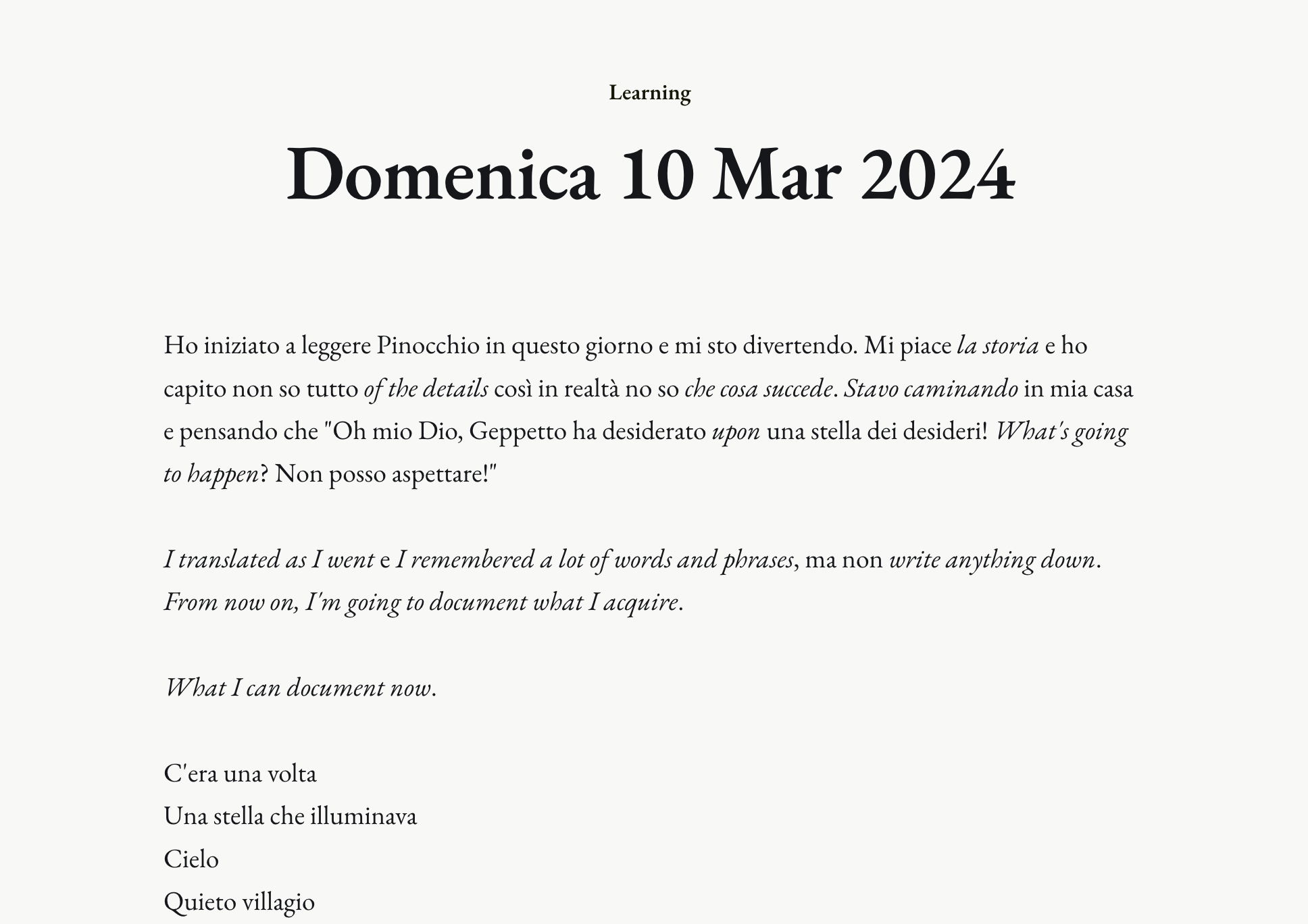
Implementing Structure
One of the most notable decisions I made on March 10th was to begin writing and interacting with Italian every day. Retrospectively, I have more grace and realise nothing was fundamentally wrong with my process, but at the time I was displeased with how many days would pass without me interacting with Italian at all. I decided, no matter what, no matter how small, no day will pass without a single interaction. What's more, I will document what I do and make use of the language in doing so.
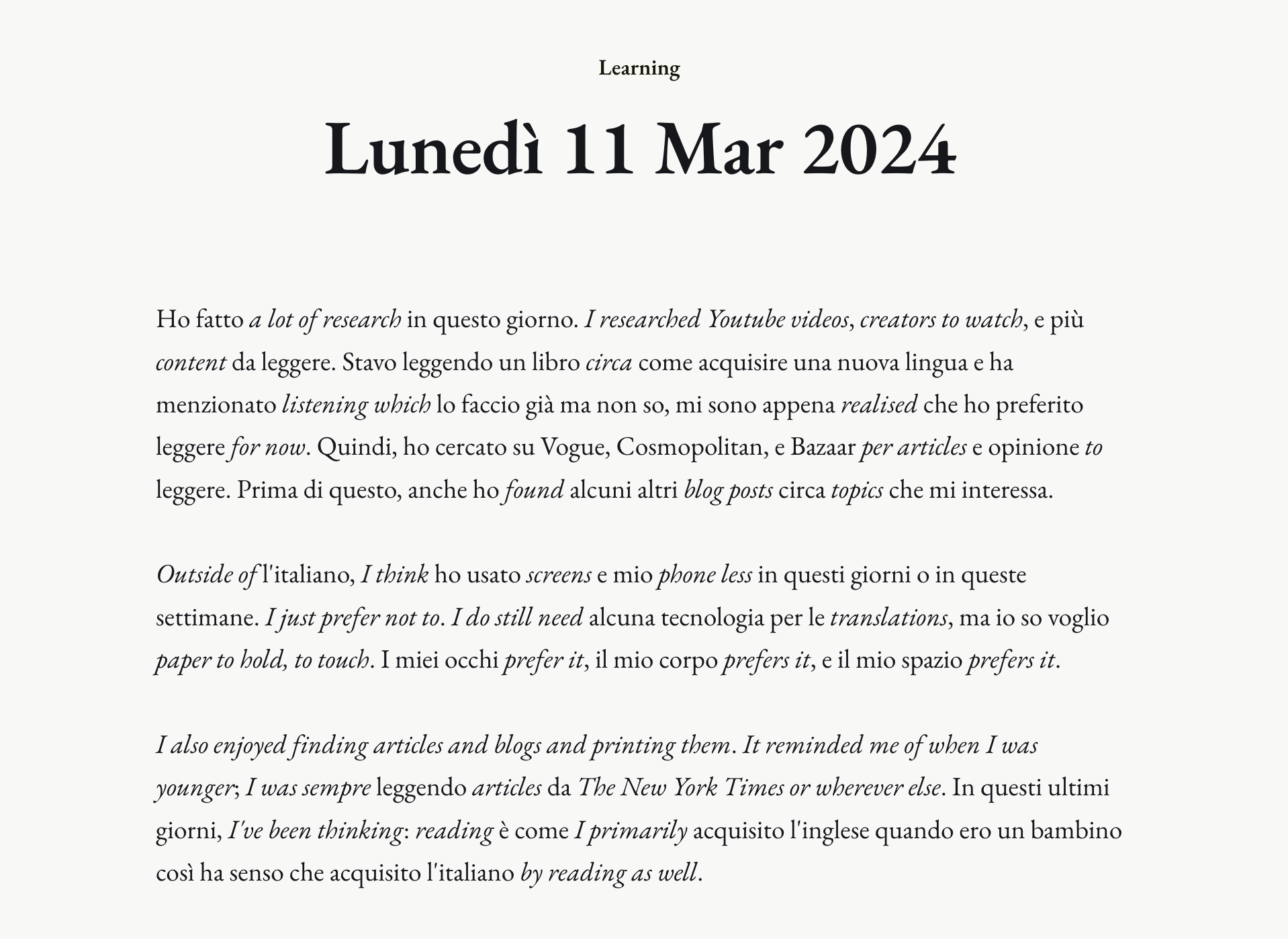
Reading & Writing
While in Chioggia, I had purchased a few books knowing how much more difficult it was to obtain Italian texts from New York. The first of these books that I opened in March was Pinocchio. I've still not finished Pinocchio, but it's been a very enjoyable read which reminds me to say you should read what you enjoy. The reason I have stopped reading it is because I stopped enjoying reading it. I did not continue a day longer. The instant I crave it again, I will pick it up.
I learned a lot from Pinocchio as can be seen in my documentation on the 10th and other days that followed. Even now, I can remember which words I first learned from that book. It usually makes me smile when I think back.
I didn't specify my methods for reading and writing so I will do that now.
For reading:
- I translated any word I did not know. Specifically, I used Reverso Context, as the contextual examples are very helpful. They are especially helpful when you are inadvertently translating only a part of a grammatical phrase and regular translation would provide you with something unintelligible. Reverso is also great for quickly seeing connections between conjugated forms and immediately teaching yourself to use a word in a way that's more applicable to you than the way in which you first saw it used.
For writing:
- As seen in the post, I listed any new words I had learned. If a word wasn't on the list, it is because it is a word I already was comfortable using and understanding from prior interactions with Italian.
- I wrote as much as I could in Italian. If I wasn't sure of how to communicate something in Italian, I used italics to indicate uncertainty. This helped relieve the pressure of perfection and immediately undermine any potential for shame, as my mind saw it as me being upfront with what I do and do not know. There are, of course, other mistakes I was not aware of not in italics, but that's okay too. I've already made clear my position as a learner and one who is ever-improving.
- For a time, when I was frequently reading, the procedure was to document new language and retell the story without looking at the original text using my new knowledge. On the days I read articles, I believe I just gave brief summaries of what they were about, sometimes only half a sentence long.
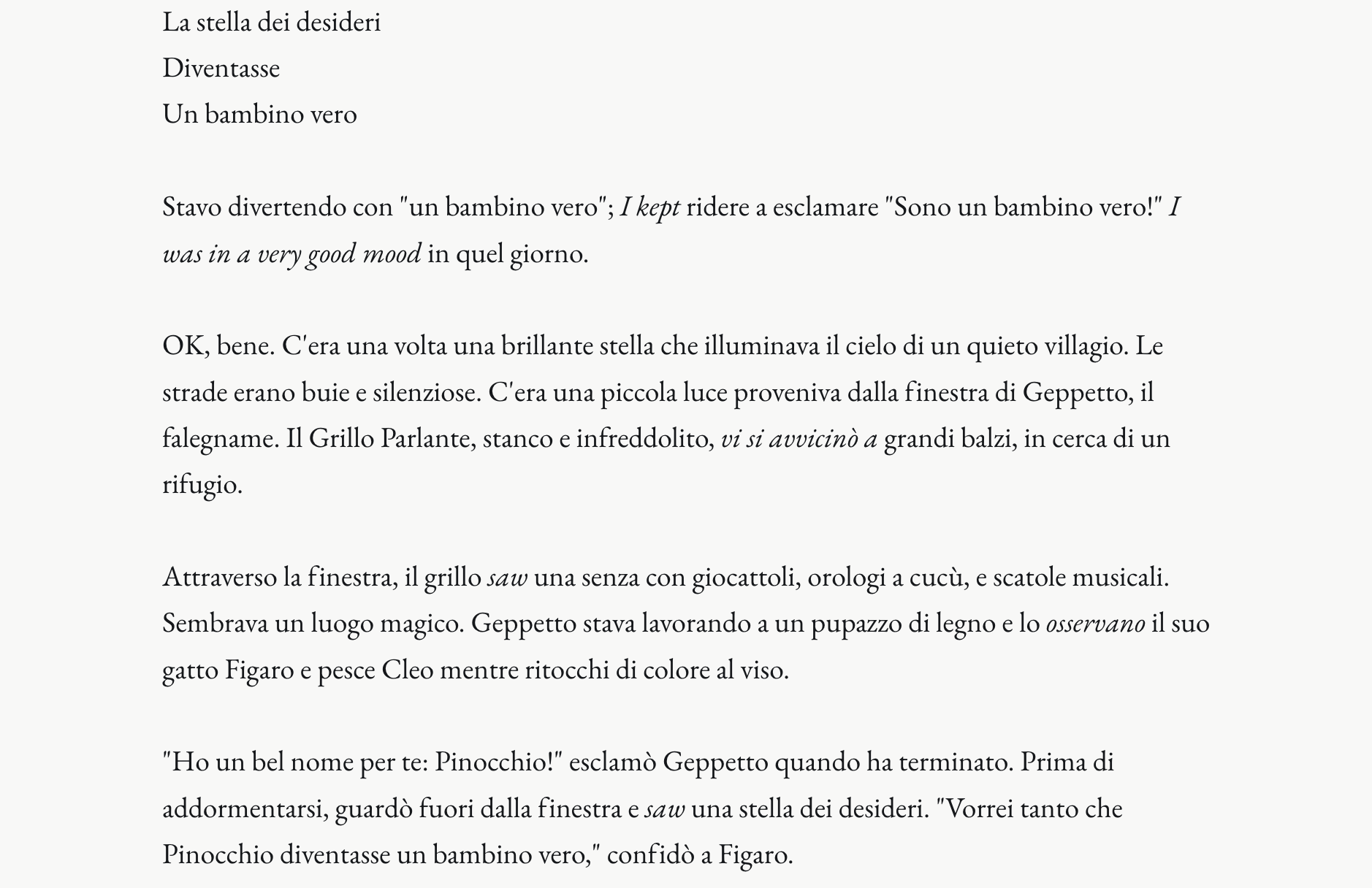
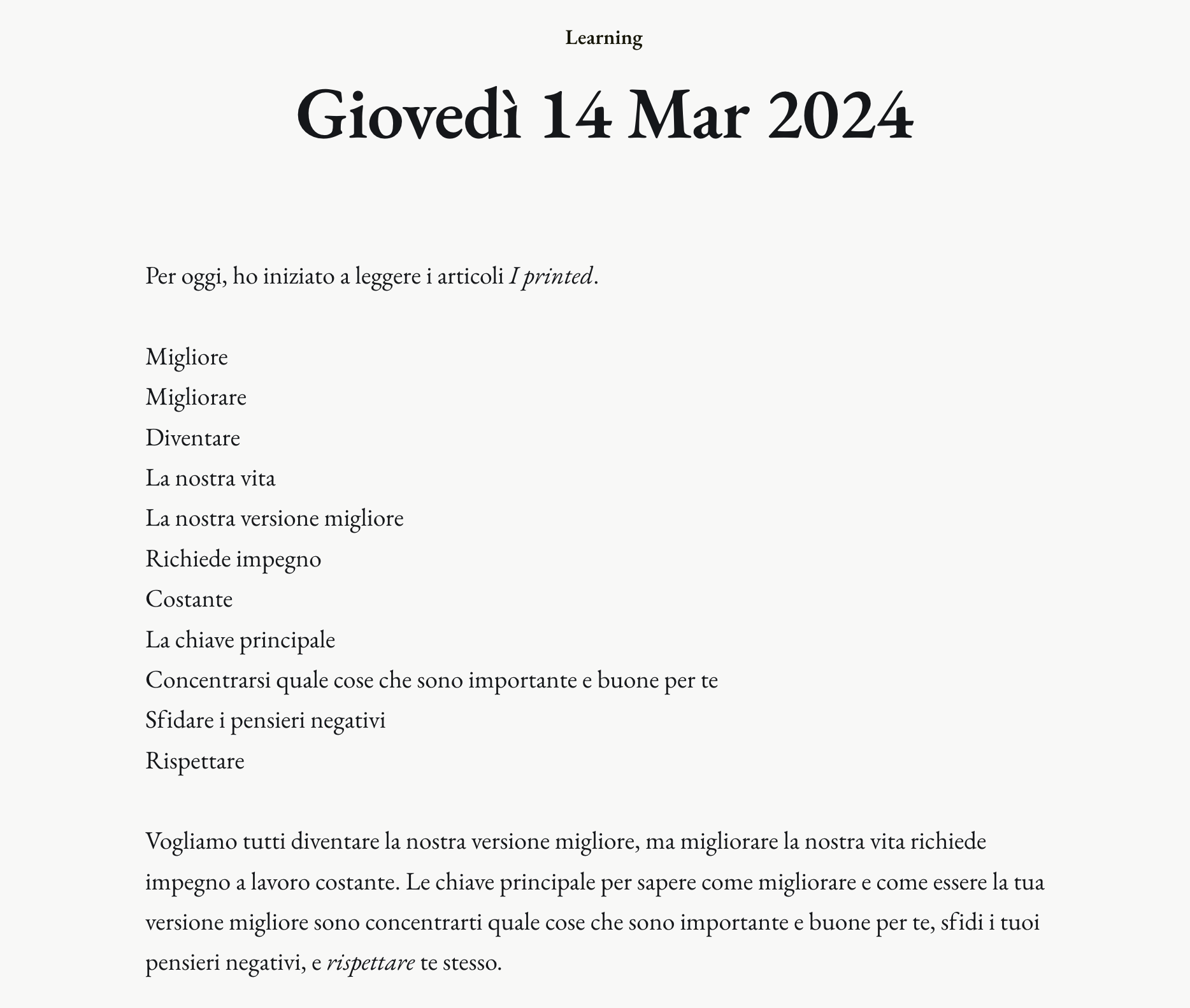
This second chunk of time also included printing many articles written in Italian, acquiring and reading Twilight, broadening my horizons on Netflix, finding content creators on YouTube, and beginning to use Anki.
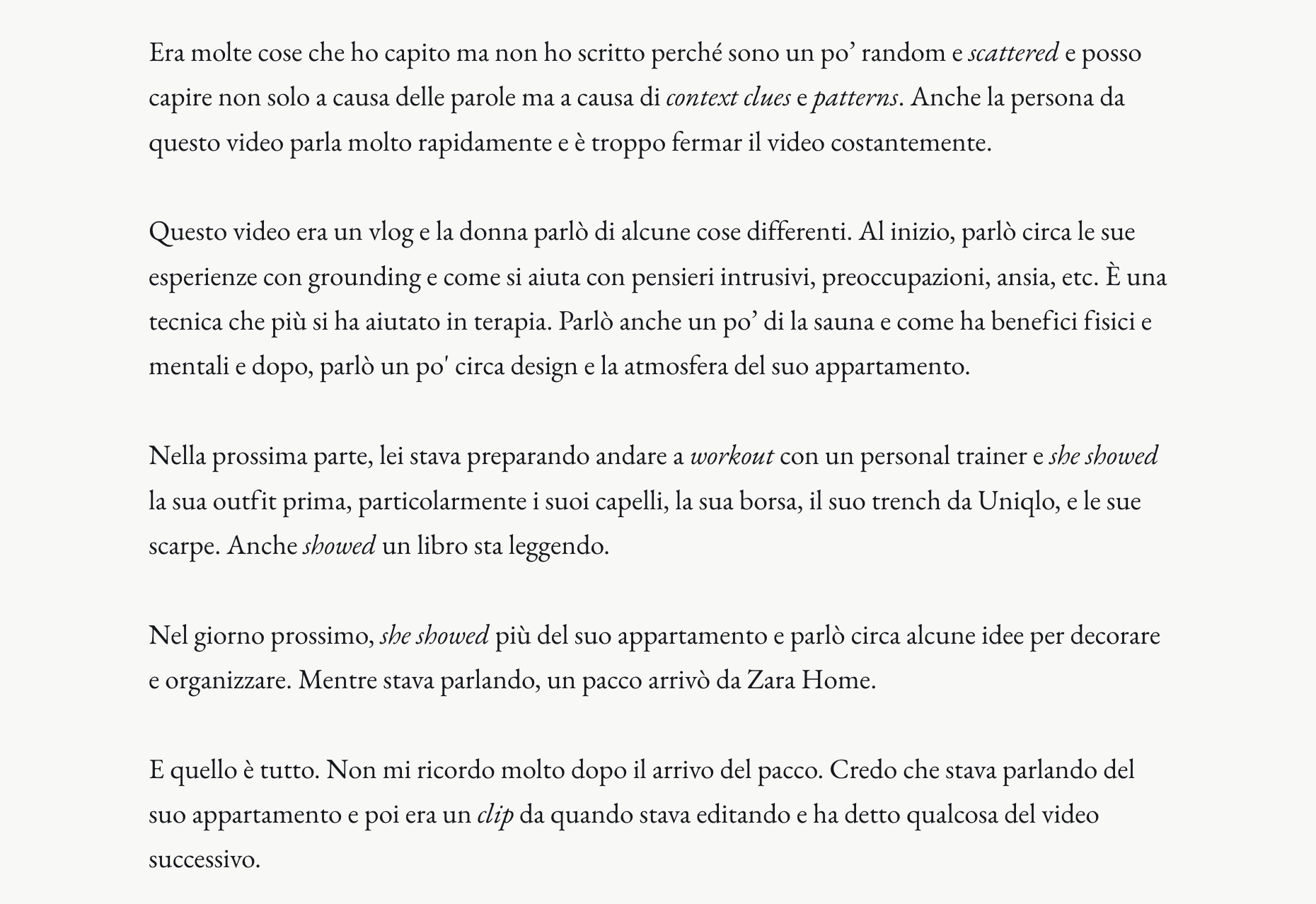
Exploring YouTube
Of this deeper exploration, one of my favourite things I did was cultivate a relationship with Italian content on YouTube. How I use YouTube, or have used YouTube, is arguably the most important feature of my relationship with Italian thus far.
I'll start by saying I have a VPN that has been set to different cities in Italy since February, whether or not I'm on YouTube. On YouTube specifically, this makes it easier for me to find content originally made in Italian. I knew the content I would want to watch mostly includes lifestyle content, vlogs, etc., so I started searching relevant terms in those niches in Italian. Other kinds of videos have crossed my path or made it into rotation, but these have really been the bulk.
First Exposures
For a while, I was watching videos without subtitles. I really enjoyed this and was able to not only understand a lot but also immediately make use of what I was hearing because of the relatability of the content. I frequently would repeat phrases back once I'd heard them, if only because they felt good to say. My method to finding videos was to pick a topic and watch several videos on that topic. If I could, first several videos by the same creator, and then videos on the same topic from different creators. I got exposure to different accents and vernacular as soon as possible to increase my ability to comprehend. Because the videos often circled the same topic, I was also rapidly learning vocabulary and essential phrases in context and intuitively picking up new words without having to research them. I found by the end of the first few days using YouTube, I understood most of what I was hearing and was following the videos closely. Even if I couldn't remember Italian vocabulary off the top of my head, I could have told you what was discussed with specificity, nuance, and detail using English. I will say, a lot of words that may be considered intermediate in English have cognates in Italian that are quite common or accessible for beginners. It was only natural this part came easily.
Immersion
In the beginning, I would have YouTube playing while completing analytical work, i.e., it was mostly playing in the middle of the day. Over time, YouTube has become one of my favourite sources to interact with, in or out of Italian, but because I have found creators I genuinely enjoy, I tend to be consuming Italian even when I'm not trying. There was a gradual shift where I would be watching YouTube earlier and earlier in the day, whether or not I was simultaneously working. This content was almost always in Italian. Eventually, I realised the first language I heard for the day for weeks at a time was Italian, as was the last language I heard for the day. By this point, I'd also been talking to myself in Italian for at least a month, so I was having days where I'd start and end my days almost entirely consuming or consumed by Italian. I decided I liked this. I was having fun, so it went further.
Deepening Immersion & Forming a Need for Italian
Beyond just starting and ending with Italian, for several days Italian content was playing for nearly all hours I was awake. If there was not something else I had to be listening to, I was almost always hearing Italian. Sometimes, I was hearing from multiple sources at once (Netflix and YouTube). There was a specific period during which I was watching YouTube at a volume higher than I usually do. There was very little opportunity for my mind to convert the audio into background noise and not actively take in what I was hearing. I sometimes did this with Netflix too, but not quite as often. I very much enjoyed this period of time, and it is still some of the most fun I've had. The instant I no longer wanted this degree of immersion, I stopped, but it lasted a while. It was satisfying as I was doing it, and I would've been understimulated without it.
I was also very intent on developing an instinct for Italian, which I found myself successful in doing. I mentioned earlier occasional difficulties processing spoken English. That occurred during this time. This period also strengthened my mind's reflex to make use of Italian, whether it was able to or not. What I wanted was for my mind to automatically go to Italian whenever I had a desire to communicate or express a concept, even if only inside my head. It's less significant that I'm unable to express every concept. What matters is that English is not always second nature. Even if I can only produce gibberish, my tongue first begins operating in Italian, and my thoughts, however disjointed, first make use of words in Italian. It is only after those first moments if I struggle that they consider using English and asking how do we communicate this in Italian. There are some common phrases of mine now that I previously would've said in English that reflexively are always in Italian. It is only after thinking or saying them that I translate back to English. This kind of relationship was my objective. Something like a child learning their first language from the world.
Confidence is usually a major requirement for communicating in a language. Even as people acquire knowledge, their speaking is impeded by a lack in their ability to trust what they've learned. I find confidence is less of an issue if my mind doesn't think it has other options. What else would it use if not Italian? It'll have to make do with what it can. If only for a moment, Italian is all it can conceive of.
While there was sometimes intention given to this kind of immersion, I want to note it was mostly natural and I was enjoying it. At no point was I consuming content only because it was in Italian. The content that most entertained me, that most brought me joy, that most made me laugh, smile, and connect was in Italian. I could've watched English-speaking creators, and at times I did, but the entertainment I craved usually happened to be in Italian. At any point, had I decided to end my relationship with Italian, the creators I was watching would've been creators I continued to watch anyway. The immersion itself was pleasurable, and at no point was it overwhelming. I may continue to stress this further, but pleasure, joy, and play have been crucial. Play, especially, is how I learn (as opposed to how I'm able to perform the act of learning). I'd safely guess this is true for others as well.
Anki
At some point during this second chunk, I began using Anki. With Anki, I studied vocabulary from Busuu and vocabulary from Fluent Forever's first 625. For the Busuu deck, I adapted a script found on Reddit to extract material from my review dashboard (if you want all of the review material to be exported and not just the material that has an example attached to it, remove "--keyphrase" from line 1). The 625 deck was found on AnkiWeb.
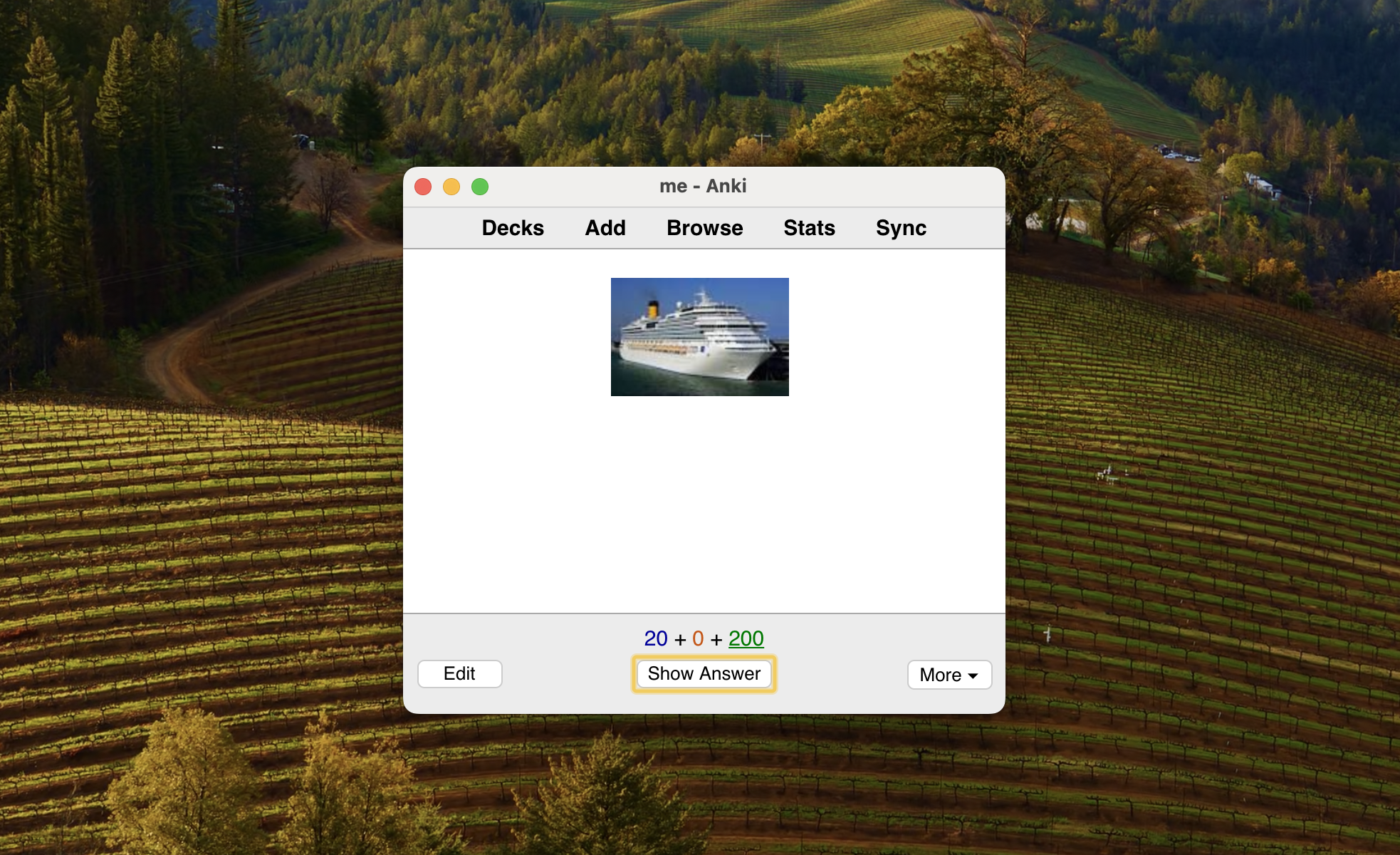
Somewhere in this time, I also used the app AnkiApp to begin studying more verb infinitives. It was a set of 186 verbs sourced from Duolingo.
Netflix
As I mentioned, I was watching Netflix throughout this period. Honestly, it feels like an afterthought because it was hardly ever a main focus for me. In my mind, I was just watching TV. Only one series stands out as having a distinct educational experience attached to it. I particularly enjoyed the show and enjoyed how much I was comprehending and repeating, so I began a spreadsheet listing the phrases I picked up. I didn't end up moving to OmniSets with this list, but I believe the attention I gave to the material I was comprehending was significant.

Speaking
Besides my usual stream of consciousness and self-talk, I had one lesson with a tutor on iTalki in June. I also switched Alexa to a multilingual mode at some point. This meant I could give all the usual commands in Italian to practice speaking, and I could access translations faster than I might if I always had to use my laptop or phone.
Evaluation
Everything in this second chunk got me fairly quickly into a high intermediate level. Noting I was off for February and about 3 weeks in January, around 4.5 months of effort ending in June brought me to an ability to comprehend most written or audio content and communicate a lot of my own ideas. I have more precision and fluidity with writing than with speaking, but when I remember I'm this way as well with English, I don't too much mind it.
Summary of Part Two
- Daily language interaction of any kind; the extent may vary greatly over time, but interaction is consistent.
- Read and translate content frequently; translate every word using Reverso Context for deeper understanding and faster development; summarise or retell from your readings [without copying the source text] whenever possible.
- Write every day whether it's documenting what you studied, talking about your day, or just saying "I didn't do much" in your target language.
- Full immersion or the deepest immersion feasible; consume content you enjoy, content you love, and content you would be consuming even if it wasn't in your target language; train a reflex for living and operating in the desired language, even if you still have difficulty using it.
- Build vocabulary with Anki, sourcing from Fluent Forever's First 625 and your lessons on Busuu.
- Use Alexa or any smart assistant to practice speaking in mundane moments.
- Continue using all previous tools and resources, develop grammatical understanding, familiarity with accents, useful sentences, etc.
- Document anything that catches your attention or anything you have an inclination towards remembering; list phrases you understand, phrases that could be useful, your favourite lines from a series, interesting words in titles, etc.
- Have a conversation with a native speaker at least once to validate what you've done so far and accept that you are capable of producing comprehensible communication.
Third
Early in July, I spent about a week braiding my hair. This provided the perfect opportunity for rejuvenation, as my connection to Italian had been waning. The most notable part of this period was once again, immersion.
Immersion: Netflix
I believe some time in June is when I started consuming content with subtitles in Italian. The first time this felt notable with regard to Netflix was during this week, starting around the 9th. This is also the first time I made proper use of my VPN with Netflix. I'd previously watched Netflix on my TV and primarily benefitted from the VPN on YouTube and in Google searches.
I watched several movies and, of course, YouTube as well. I was often awake through the night braiding my hair or tending to it in some way. I was kind of binge-watching these movies, and they were truly my primary source of entertainment. Again, this was natural. I had already been meeting my minimum requirements for interacting with Italian, and I could've easily done anything else without feeling I hadn't done enough. These movies, series, etc. were the genuine preference to alternative entertainment in English. I wasn't watching as a learner; I was watching as someone who wanted to watch movies while they ate dinner and braided their hair, that's all. I think this ease helped my receptivity.
The first movie was really good, but it was during the second that I began feeling like I was watching a movie in "my own" language. I wasn't thinking about Italian; sometimes needed subtitles, sometimes didn't; and my mind was most active with regard to the story being told.
Immersion: Audible
I continued watching movies, series, and YouTube videos for a few days, eventually also adding in audiobooks. I'd already been listening to a lot of audiobooks in English, and it occurred to me to look for some in Italian. I was able to find translations of books I know on Audible, so they were pretty immediately comprehensible. One night in particular, I listened for about 12 hours, and at least by halfway through, I again reached a point where I wasn't always aware I was consuming content in Italian. I was just consuming a story.
I should note, I was able to get a three-month free trial for Audible. With this trial, I've been amassing a little collection of books to listen to before three months pass. I maybe would've bought one or two books without a trial, but otherwise, I doubt I would be making such thorough use of audiobooks.
I should also note, I am listening almost entirely in one genre with which I am already very familiar: romance. Similar to the method of watching different YouTube videos on the same topic, this path allows me to quickly understand new texts (or audios) even if I do not know them in English or the only version that exists is Italian. There are a lot of tropes and cliches in the romance genre, not just in the plot but in specific lines, phrases, descriptions, etc. All of this seems to extend beyond national or cultural borders. Even if I only begin with a handful of familiar words and cognates, I almost never pass 20 seconds without some degree of comprehension, and usually, the comprehension is significant. Sometimes there are key words that entirely change a sentence's meaning, and I don't know them. If the following sentences don't clear up the general idea of what's happening, in Italian, I ask Alexa what the words mean in English.
I haven't watched movies as much since braiding, but I have still listened to books. I listened regularly enough that I sometimes didn't mention it in my daily posts, much like how I listen to music.
I'm also recalling now, I had previously begun audiobooks for Twilight on YouTube. The first time was maybe as early as April, and the second time, closer to July. I remember finding it comprehensible, but the fact I forgot this happened perhaps speaks to its minimal significance or how little attention I put towards it at those times.
Communication
In addition to brief updates here, I started committing to communication via iTalki and HelloTalk. I'd already been making some use of iTalki, but HelloTalk I hadn't used in several years.
The concept of HelloTalk so appeals to me, I think there was a time when I wanted to study a language just to begin making use of it. I've kept this app close in my memory over the years and when I started with Italian, I knew it was something I'd come to use in time. That time had finally arrived.
There's not much to say beyond I enjoy getting to make regular use of my knowledge in Italian and having conversations with native speakers. This was one of my main objectives when I started learning and I reached the conversational point at least two months sooner than planned, so it's been very gratifying.
Maintenance
The remainder of this period was mostly maintenance of past practices. I occasionally tried out a new app or technique that interested me, even if I only did it for a day. Generally, I like to have as many learning and contact options as possible, so when one stops adequately serving my needs and interests, I have others to turn to.
Evaluation
I don't know exactly when it happened — I think it probably was the braiding week — but at some point a new degree of comfort, confidence, and assumption settled in. Although I did take a few placement tests, this is the point at which I cared less about my exact level and more distinctly felt I live a life in Italian. It's not that every day felt so much that I was in that life, but I knew I could access that life when I wanted to. I could almost always say what I needed, even if that meant settling for a less precise statement; most of my day was happening in Italian; my own thoughts would no longer go beyond a minute without containing Italian; and I would do something like pick up an Italian book the same as I would pick up an English one. I was already working with an ability to command myself in some sense (eg. "I do not know [language]", "I understand English", "I do not speak [language]", "I understand Italian", etc.), but more specifically, at this time I didn't even feel I had to do this sort of thing. In the same way it wouldn't even occur to me to assume I know English, because, well, of course I do, it stopped occurring to me to assume I know Italian. I could still encounter plenty I did not know, but it was more like an 8-year-old me encountering English I did not know. This transition to finding Italian fairly normal probably fostered a lot of my displeasure with the then structure of my relationship with Italian. Next, I'll discuss what I do now.
Summary of Part Three
- VPN — access more content in your target language, beyond subs, dubs, and translations.
- Netflix — watch anything you want, span the same genre whenever possible to build up vocabulary intuitively and comfortably; watch hours of content at a time when possible only as desired.
- Audible — consume as many audiobooks as you can find, within the same genre whenever possible.
- Alexa [or any smart assistant that will communicate in two languages] — ask anything you do not know in the target language (eg. "Come si dice [qualcosa non ho capito] in inglese?"); ask what you want to know using your native langauge (eg. "How do you say [phrase of interest] in Italian?").
- iTalki — increase the frequency of your conversations with native speakers, gain exposure to different kinds of conversations you may want to have, develop specialised vocabulary around topics of interest, refine vocabulary choices, etc.
- HelloTalk — make connections with other native speakers of your target language, develop friendships or relationships with dedicated language exchange partners; refine vocabulary and writing, receive immediate and consistent feedback.
Now
By the end of July, I was quite fed up with the structure I had. It was tedious and I had fewer and fewer happy interactions with Italian. I'm realising now, Italian has become such a regular part of my life that the idea of documenting every little interaction and every little thing I do is torturous. That's like forcing myself to sit every day and write, "Today I went to the store, and when I interacted with the cashier, it was in English. I bought a bar of chocolate with packaging in English, and I was able to understand it. In the car, the radio was in English and I enjoyed the music that played." Actually, I found that more interesting to write, because where I was with Italian at the time, I was mostly doing the same thing every day. It was a chore to open my laptop every day to make "updates", and there wasn't enough breathing room to allow me to be inspired. I wasn't letting anything new come to me. My thoughts and actions had already been determined. I wasn't having fun.
At some point it occurred to me, I run this, and I was like, wow, I can stop just because I say so. It's been amazing since. Prior to this lull, I hardly ever had an interaction with Italian that did not include laughter, smiling, joy, or broader happiness. Since shifting my structure, that is again the norm.
On August 2nd, I made a post and described a bit of what would be changing. Most notably, I do not make posts of what I do every day. They were often incomplete anyway, and I am far more refreshed writing once a week. I can also make time to write a bit longer each time when I structure my practice this way.
Now, I can continue interacting with Italian every day, but without the looming task of updating a post. If I know I'm to document exactly what I do in Italian and I have other tasks to accomplish in my day, I'm somewhat incentivised to interact with Italian less to make sure I have time to note everything I have done. This was especially the case as I've increasingly put focus and energy on other projects, new work, tending to relationships, etc.
I was also developing a rigidity around taking notes. Because I saw this as my place to take notes but I did not enjoy taking notes here, I was often not taking all the notes I could've been. This was even happening quite early on with something like documenting my progress through Twilight. It would take hours to type out everything I was learning. My inclination wasn't to then take notes elsewhere. It somehow was to not take notes at all. I think I would intend to return and update with all of my knowledge, but that just wouldn't happen, so that notetaking opportunity ended up lost as I emotionally moved on.
Keeping a journal by hand allows me to take fast notes, annotate notes, highlight notes, reread notes, etc. I'm loving it.
There are some specific methods I'm enjoying and new ideas I've had, but that will all go in the next section since it's at most been 11 days since I've used any of them.
Also, I've stopped using Busuu consistently, and it's been a couple of weeks since Anki.
Summary of Now
- Live — live in your target language as you would any other.
- Take notes by hand — continue interacting every day, taking note of whatever interests you; annotate your notes with colour-coding if that at all intrigues you.
- Do what you want — you are in charge of this, there is no one else, you answer to you; be honest about what you know of how your mind works and what your needs are; very few things [if any at all] can be adequately described by "being lazy", think deeply, figure out why you are not committed to certain actions or why you are resistant to them; figure out which of your needs are and are not being met; re-adjust and set new priorities as needed; skipping the intellectual work of understanding yourself to dismiss yourself as just not wanting to do something will not give you the answers you need to find success quickly and smoothly.
Techniques for Future
Already in Use
- Aside from regular journalling and notetaking, write a few hundred words once a week. Publish if possible.
- Keep a notebook of anything that interests you. Write down solitary sentences or word pairings you like or may want to use. Write down a sentence you heard in a show that made you feel pleased when you realised you could understand it. When you have thoughts throughout the day in the language with which you're building a relationship, write them down. Allow that stream of consciousness to continue and research anything you do not know how to communicate. Research using a combination of DeepL, Reverso Context, and HiNative. Accept that you are someone who can communicate in this language as you just have.
- Annotate your writing. In my notebook, I have four colours for annotation.
- Blue for topic headings (if that's relevant, like when taking notes from a YouTube channel that teaches Italian),
- Red for essential vocabulary and phrases I had to research to be confident in or learn for the first time (essential as in essential based on how I speak, how I communicate, the words and phrases I am likely to want or need most often),
- Green for new information not deemed essential, and
- Purple for anything I'm still not completely clear on even after finding translations.
Just Started or To Be Used
- Write down sentences from texts you read and list alternates relevant to you. I've started doing this with Twilight to foster relationships with new grammatical structures and verb tenses I hardly use, to think creatively, to advance my Italian communication ability closer to my ability in English, etc.
- When you search for a word on Reverso Context and immediately start noticing examples you might use or things you've said in your native language, write them down. They could seem randomly placed on your page, but write them down. If any other sentences occur to you now that you have context, write them down. Anything that comes to mind in that moment, write it down.
The general idea moving forward is: live and write it down. Be unorganised if you must, but live and write everything that catches you down. Since I almost always have my notebooks on me, I can flip through them and continue repeating phrases or rereading my writing as often as I want. I also print my weekly writing and keep those in the primary bag I carry about. When I have moments to, I reread and annotate those as well.
I may or may not update with little things that didn't get mentioned, like writing my typical tasks and to-do lists in Italian. I'll likely also make posts on specific tools like Busuu or Anki, as there are some notable points to be made about how I used them.
Oh yeah, funnily enough, during the second learning chunk, a lot of knowledge I'd genuinely forgotten from Spanish began returning. I'm not even referring to knowledge I tried to compel myself to forget. There were things I wouldn't have had any idea how to say if you'd asked me in November of 2023, but for whatever reason on some beautiful day mid-May, an entire sentence would pop into my head when I went to speak in Italian. I have noticed lately (since the start of August) that when I've come in contact with Spanish aurally and understand it, I'm understanding it as someone who knows Italian, not as someone who has spoken Spanish. It's not being understood in the sense that I once had this knowledge and it's familiar. It's being understood in the sense of wait; that sounds familiar; oh, it sounds quite a bit like this word in Italian, I suppose it means the same thing. Sometimes, minutes after this first feeling, I can start recalling from my past knowledge in Spanish, but it takes a pretty concerted effort for this to produce results, and even then, the connection doesn't feel quite there. Just something I've noticed that I find cool.
I forgot to mention time spent learning Russian, American Sign Language (ASL), and La langue des signes française (LSF).